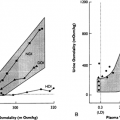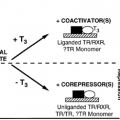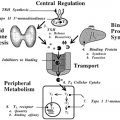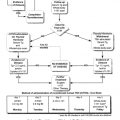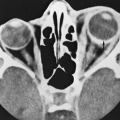HYPOPITUITARISM
Joseph J. Pinzone
The pituitary gland comprises anterior and posterior divisions. The anterior pituitary gland secretes adrenocorticotropic hormone (ACTH), thyroid-stimulating hormone (TSH), follicle-stimulating hormone (FSH), luteinizing hormone (LH), growth hormone (GH), and prolactin. The posterior pituitary gland secretes antidiuretic hormone (ADH) and oxytocin. Signs and symptoms of hypopituitarism result from reduced secretion of one or more of these hormones. Although some patients have total failure of pituitary function (i.e., panhypopituitarism), more commonly, only one or several hormones are deficient (i.e., partial hypopituitarism). Deficiency of only one pituitary hormone is called selective or isolated hypopituitarism. This chapter will deal primarily with deficiencies of anterior pituitary hormones of adults (see Chap. 25 and Chap. 26 for a more complete discussion of deficiencies of ADH and oxytocin and Chap. 18 and Chap. 198 for pediatric neuroendocrine and GH dysregulation).
The most common selective deficiencies are those of GH or the gonadotropins. In progressive loss of pituitary function, as with a slowly growing pituitary adenoma, TSH, ACTH, and ADH are often the last to be diminished, not uncommonly in that order. Because the causes and manifestations of hypopituitarism are protean, the prevalence of hypopituitarism is difficult to estimate accurately. However, the major cause of hypopituitarism is pituitary tumors. Prevalence of pituitary tumors in the United States was reported to be 22,517, although this is probably an underestimate.1
Anterior pituitary hormone deficiencies lead to end-organ failure (e.g., diminished ACTH leads to decreased adrenal cortisol production). Syndromes associated with pituitary hormone insufficiency are termed secondary or central (e.g., decreased adrenal cortisol production that is due to diminished ACTH secretion is termed secondary or central hypoadrenalism). Technically, hormone deficiency syndromes resulting from hypothalamic failure should be called tertiary, but hypothalamic hormones are not measured in clinical practice. Consequently, conditions resulting from inadequate levels of either hypothalamic or pituitary hormones are referred to as secondary hormone deficiencies.
Stay updated, free articles. Join our Telegram channel

Full access? Get Clinical Tree


